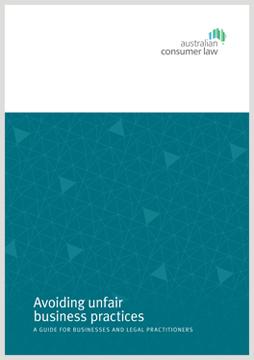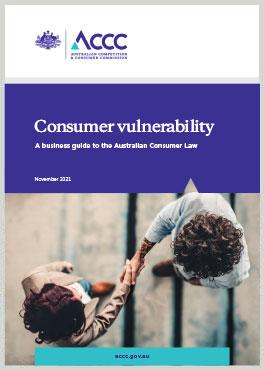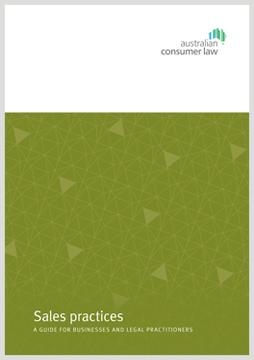On this page
Contract terms that are unfair
Consumer law protects consumers and small businesses against unfair terms in standard form contracts.
See Contracts for more information.
False or misleading claims
Claims that businesses make about their products or services should be accurate, true and based on reasonable grounds. It’s against the law for a business to make false or misleading claims.
See False or misleading claims for more information.
Not delivering products and services that are paid for
Businesses must not accept payment for products or services that they don’t intend to supply.
See Not receiving products and services that are paid for for more information.
Pressuring and harassing consumers
It’s against the law for a business to use physical force, coercion or undue harassment against consumers.
Coercion can mean using force, or threats of force, to restrict someone’s choice or freedom to act. It could also include exploiting known facts, circumstances or statements made by a consumer to force them to do something.
Undue harassment means unnecessary or excessive contact or communication with a person, to the point where the person feels intimidated, tired or demoralised. It could include unwanted persistent phone calls or over-the-top sales methods.
This behaviour is against the consumer law when it’s used to sell products and services, and to collect debts.
The use of physical force or threats of force is also a serious criminal law issue and should be reported to your local police.
See Telemarketing and door-to-door sales and What debt collectors can and can’t do for more information.
Pyramid schemes
It’s against the law to participate in, or to persuade someone to participate in, a pyramid scheme.
In a pyramid scheme:
- people must pay to join (a participation payment).
- people are promised payment for recruiting others to the scheme (a recruitment payment)
- only a small number of people at the top of a pyramid scheme are likely to receive any real financial benefits from it.
Pyramid schemes are different to multi-level marketing schemes. In pyramid schemes, people in the scheme only make money from the recruitment of other people. In multi-level marketing schemes, people in the scheme make money from selling a genuine product or service. Pyramid schemes can sometimes involve selling a token product or service, but the only real way people can make money in a pyramid scheme is by recruiting other people rather than by selling the product or service.
Referral selling
Businesses often try to increase their sales by encouraging consumers to refer their friends. Whether these referral offers are legal depends on the situation.
When making a new sale, whether to an existing customer or a new customer, a business is allowed to give the customer a discount in exchange for contact details of the customer’s friends. However, the customer must receive the discount whether or not the friends go on to buy anything. If the discount depends on the business making a sale to one or more of the friends, this is against the law.
Businesses can make ‘refer a friend’ offers to existing customers. For example, a meal kit subscription service could legally offer an existing subscriber a voucher in return for them getting a friend to subscribe via a referral link.
Unconscionable conduct
Unconscionable conduct is behaviour so harsh that it goes against good conscience. Under consumer law, businesses must not act unconscionably towards consumers or other businesses.
There is no precise legal definition of unconscionable conduct as it is a concept that has been developed and considered on a case-by-case basis by courts over time.
Courts will generally consider whether the conduct is against the morals and principles of the community.
For courts to decide that behaviour is unconscionable, it’s not enough for it to be unfair. There must be something extra that makes it especially harsh. For example, if the business knowingly targets consumers who are experiencing vulnerability, which may be people who:
- are going through something difficult like the death of a loved one, domestic or family violence, homelessness, or the impact of a natural disaster
- are sick or have disabilities
- are too young to make informed decisions
- have difficulties reading and writing
- have difficulties understanding and using basic financial skills
- don’t speak English as their first language
- live in remote areas
- don’t feel confident using some basic technology, such as the internet or smartphones.
Conduct may also be unconscionable in other situations that don’t involve knowingly targeting these kinds of consumers.
When deciding whether behaviour is unconscionable, the law says that the courts may also consider a range of other factors, including:
- the bargaining strength of the parties compared against each other
- whether the stronger party put any conditions on the weaker party that were not reasonably necessary to protect the stronger party’s legitimate interests
- whether the weaker party could understand any documents used
- the use of undue influence, pressure or unfair tactics by the stronger party
- the price or other terms on which the weaker party could have got the same or similar products or services from another business
- whether the stronger party acted unreasonably in not informing the weaker party about key risks that the stronger party should have known the weaker party was not aware of
- the requirements of applicable industry codes
- the willingness of the stronger party to negotiate
- whether the stronger party was able to change the terms of the contract without the weaker party’s agreement
- whether the parties acted in good faith.
But the courts will also look at all the factors involved in the issue, not just those listed above.
We take legal action against businesses that we believe have behaved unconscionably. If a court decides that a business has engaged in unconscionable conduct, there can be serious financial penalties. The business can also be made to fix any problems caused by its behaviour. See examples:
Guides for business on unfair practices
These guides include help for businesses to understand how to engage with consumers experiencing vulnerability, and things businesses can do to avoid acting unconscionably or unfairly.






